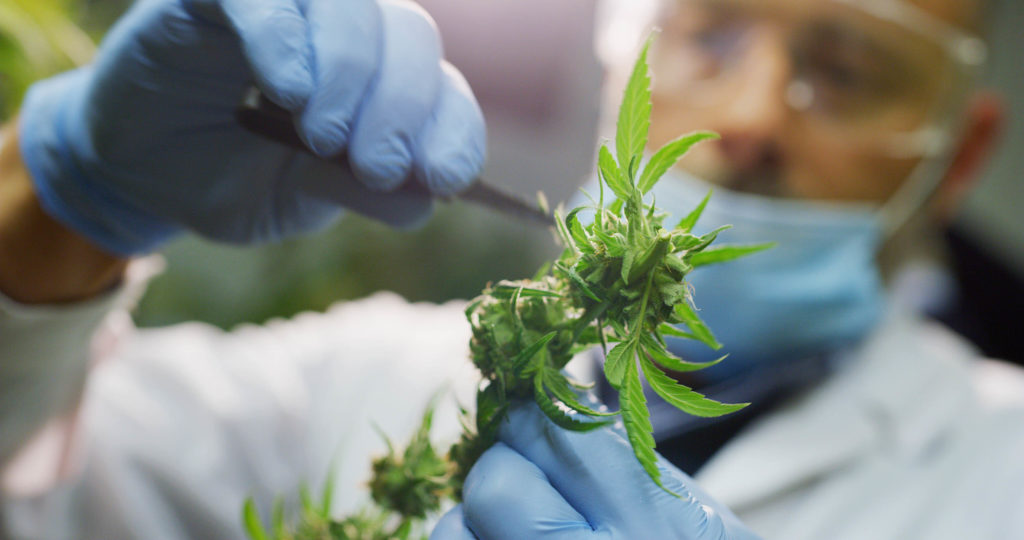Crohn’s disease is a type of inflammatory bowel disease that is believed to be caused by a combination of immunological, genetic, and environmental factors. The disease is progressive and incurable, and causes a range of severe and debilitating symptoms. Substantial evidence indicates that cannabis can help to manage symptoms.
Crohn’s disease is often mischaracterised as an autoimmune disease, while it is in fact an immune deficiency state. This state depends on a variety of genetic, environmental and immunological factors and has no known cure to this day. The chronic inflammation of the gastrointestinal tract provokes symptoms such as mild abdominal pain, bloody diarrhoea, nausea, vomiting, weight loss, and fevers.
Modern medicine aims at reducing these symptoms to keep the disease in remission using several methods, from a light change in diet to steroid treatment or even surgery to remove the affected area of the tract. The treatment method depends on the severity of the symptoms and therefore falls on a spectrum depending on the person.
Anecdotal evidence, like the story of Shona Banda, suggests that the medicinal (especially anti-inflammatory) properties of cannabis have a positive effect on patients suffering from Crohn’s disease. Shona’s story can be watched here.
Alongside anecdotal evidence is the volume of scientific research. Crohn’s disease is one of the most investigated topics for the application of medicinal cannabis. Certain experts have even hypothesized that at the root of Crohn’s and other irritable bowel syndromes is a clinical endocannabinoid deficiency, which will be investigated later in this article.
1. Cannabis is anti-inflammatory
Inflammation is the primary driver of Crohn’s disease. The disease may affect any part of the gastrointestinal (GI) tract from the mouth to the anus, but the most commonly affected areas are the colon and the ileum (the large and small intestine). The terminal section of the ileum that connects to the colon is the most drastically affected: Crohn’s disease can affect any part of the GI tract, involving the colon in around 60% of Crohn’s cases.
Patches of chronic inflammation can lead to diarrhoea, bleeding and tearing of the GI tract lining, and bowel obstructions. In severe cases, portions of the intestine may need to be removed entirely.
Cannabis is currently being researched for its potential to treat Crohn’s and other inflammatory bowel diseases especially because of its anti-inflammatory effects. This is supported by the fact that endocannabinoid expression in the GI tract is implicated in patients with Crohn’s disease.
Interestingly, there is a higher prevalence of cannabis use among those with inflammatory bowel diseases such as Crohn’s disease. It’s unclear as to whether this is because of cannabis’ analgesic properties or if patients experience pain relief as a consequence of its anti-inflammatory properties.
In general, THC and CBD have been medically accepted as powerful analgesic agents. Because Crohn’s disease is specifically characterised by inflammation of the gut and intestines, CBD, THC and other phytocannabinoids are targeted treatments. However, while the analgesic properties of CBD and THC can be hypothesized to be effective treatments for inflammatory bowel diseases, the degree to which they help in Crohn’s disease patients is yet to be researched properly.

The CB2 receptor (found abundantly in the gastrointestinal tract) plays a role especially in inflammatory pain models. This poses an avenue of research and understanding for how phytocannabinoids can be used to decrease gastrointestinal inflammation and pain in patients with Crohn’s disease.
2. CBD may have antidiarrheal effects
Diarrhoea is the most common primary symptom of Crohn’s disease. Depending on what part of the GI tract is affected, the stool may be mixed with mucus, pus or blood, and may be more or less watery. A sensation of urgency to defecate is common, along with a sensation of incomplete evacuation (known as tenesmus).
Medical science does not commonly associate cannabinoids with antidiarrheal qualities, but elementary research is beginning to point in this direction. In one study conducted on mice, researchers found that selective inhibition of FAAH enzyme produces antidiarrheal and antinociceptive effects. This effect is essentially mediated by endocannabinoids as FAAH is responsible for breaking down endocannabinoids. When FAAH is inhibited, serum endocannabinoid levels are higher, and this reverses hypermotility and reduces pain in gastrointestinal disorders.
From this, it can be hypothesized that ingestion of CBD may encourage antidiarrheal effects, although there is no specific research which suggests this. Rather, this inference can be made because CBD is an inhibitor of FAAH, and inhibition of FAAH results in higher serum anandamide levels.
Activation of the CB1-receptors in the GI tract may also play an important role in improving symptoms of diarrhoea by reducing intestinal motility and fluid secretion. It is thought that this occurs through inhibition of acetylcholine released from the enteric nerves (i.e. those found in the peripheral nervous system, which help regulate the GI tract). Acetylcholine, a neurotransmitter with a wide range of important functions, is well-known to increase peristalsis (gut motility).

3. Cannabis is a strong analgesic
Up to 80% of IBD patients suffer from chronic pain. In terminal ileitis (the form of Crohn’s that affects the terminal ileum), pain in the lower right side of the abdomen is common, and is often mistaken for appendicitis.
Pain can be a result of chronic inflammation, but may also be a result of tearing or denudation of the intestinal lining, abdominal distention or bowel obstructions.
Cannabis may help improve symptoms of pain in Crohn’s sufferers by directly acting to reduce inflammation, by reducing the severity of abdominal distention, and by easing the symptoms of diarrhoea through reduction of gut spasms and inhibition of fluid release.

Although no formal studies into the effects of cannabis use on Crohn’s-related pain have been conducted thus far, there have been several questionnaires and surveys of patients who have reported significant improvements in management of chronic pain. Furthermore, cannabis has been shown to have analgesic effects in countless other medical conditions and is even used by patients simply for the treatment of chronic pain.
A pilot study conducted in California in 2005 questioned 12 Crohn’s sufferers on their perception of various major symptoms before and after commencing use of cannabis. Cannabis use was reported to improve all evaluated signs and symptoms, including pain—which was reported to rank up to 6.5 out of 10 on a subjective scale of severity prior to cannabis use, and just 2 out of 10 subsequent to cannabis use.
4. THC stimulates appetite (orexigenic)
The aforementioned pilot study also found that patients reported a marked improvement in appetite when using cannabis, from approximately 1 out of 10 to almost 7 out of 10 on the scale. Appetite loss is a common symptom of Crohn’s, and often occurs with nausea and abdominal pain.
Severe appetite loss can lead to dramatic unintentional weight loss in particularly bad flare-ups. As well as improving appetite, cannabis use led to less frequent defecation due to its influence on gut motility; these two factors combined caused the majority of patients to achieve weight gain after commencing use of cannabis.
THC is the main culprit when it comes to appetite stimulation. It is thought to do this by triggering the olfactory part of the brain, which is responsible for smell sensations. Heightened sense of smell leads to a greater appetite. This is basically the scientific explanation of why THC causes the munchies.

Cannabis use can also increase appetite in Crohn’s sufferers by reducing abdominal pain and inhibiting excessive peristalsis; however, it also helps to increase sensations of hunger by directly agonizing certain receptors in the GI tract that usually respond to the presence of ghrelin (an important ‘hunger hormone’ that has also shown signs of being a useful treatment for Crohn’s).
Various studies have shown that presence of ghrelin or cannabinoid agonists such as THC cause increased production of an enzyme—AMP-activated protein kinase (AMPK)—in the hypothalamus.
The enzyme is crucial to the metabolic processes that regulate energy homeostasis (energy balance) in the body, and is produced in response to stimulation of the GHS-R1a ghrelin receptors found in the GI tract.
Thus, THC can effectively do the job of ghrelin by activating the receptors and directly stimulating the brain to produce sensations of hunger.
5. Cannabis may rectify a clinical endocannabinoid deficiency (CECD) that causes Crohn’s disease
A new school of thought by Dr. Ethan Russo was presented as early as 2003, where Russo proposed that at the root of many treatment-resistant conditions is a clinical endocannabinoid deficiency (CECD). Irritable bowel syndrome and related illnesses such as Crohn’s are among this list of treatment-resistant conditions.
Russo’s hypothesis rests on the basis that all humans have an endocannabinoid tone which defines endocannabinoid levels, their production, their metabolism and the abundance or lack thereof cannabinoid receptors. A deficiency in any of these aspects of the endocannabinoid system may result in Crohn’s disease among many other related health conditions.
Ingestion of cannabinoids such as CBD and THC may restore balance to a deficient endocannabinoid system, thereby providing relief. Furthermore, Russo identified genetic variation affecting the endocannabinoid system that resulted in symptoms akin to irritable bowel syndrome. THC treatment slowed colonic transit time in those with this genetic variation, and it is therefore hypothesized that cannabinoid receptor-related mechanisms are at play with the onset of chronic gastrointestinal problems.
Thus far, there is a lot of scientific evidence to support why cannabis can be useful for those with inflammatory bowel syndromes such as Crohn’s disease. However, there is still a dire need for human medical trials to take place, to fully understand how these mechanisms of cannabis work specifically in Crohn’s patients.
- Disclaimer:This article is not a substitute for professional medical advice, diagnosis, or treatment. Always consult with your doctor or other licensed medical professional. Do not delay seeking medical advice or disregard medical advice due to something you have read on this website.












I never knew that cannabis has anti-inflammatory properties that can help relieve pain from those who are suffering from Crohn’s disease. My sister-in-law has the disease and there will be times in the day where she is experiencing extreme pain. I appreciate that you’ve also laid out all the cannabis benefits that are vital to a Crohn’s disease patient. I’d be sure to have my sister consult a medical professional if she can have cannabis legally prescribed to her. Thanks for the informative read!
Cannabis certainly has a lot of medical benefits and can provide relief for gastrointestinal disorders. The available clinical evidence and anecdotal reports are fascinating and hopefully, we will continue to hear more success stories of patients on their path to recovery.
According to this page, which cites a study, cannabis has only a covering effect for Crohn’s and can cause problems outside of helping symptoms.
https://www.emaxhealth.com/1020/what-effect-does-smoking-marijiuana-have-crohns-disease
My son, 3.5, has been taking cbd for a little over a month for his Crohn’s. It’s really helping! We noticed a significant improvement within two weeks and he has been going steady for most of that time. Had a minor flare over Christmas, but I think we are back on track now.
-Sara
To the M.D. 7mg per 50 pounds per sitting up to not pass 3 sittings a day is how i was told to use it.
I have had a colon resection 42 years ago
Things are always up the down
I have had crohn’s for 45 years
tried remincade bad side affect
I’m on humira 40mg pen every week
This info was great!!!!
Thanks
Hi Seshata
I have Crohn’s pretty bad and have had surgery in the past. I looking for a type of marijuana seed to grow my own plants in helping to fight Crohn’s. If you have other advice for me feel free to pass it my direction. Thank you in advance for your help. Jim
hoe do you dose it? I m a M D, we hace just release medical use of marihuana. I Wonder how to indicate, like pills.. how much miligram in oil? or something like that. thanks
I was diagnosed with Crohns back in 86 and have had numerous surgeries for it. I have also been on all of the treatments for it and have failed of of all of them. I have asked my doctor about mmj for my crohns but get the usual run around. Dam near impossible to find a doc that will prescribe it for me even though it’s allowed up here in Canada. The doctors would rather push the opiates.
John collins.
Try cdb oil. It’s legal in florida and has worked for me.
I was diagnosed with crohns disease in February 2015 after months of intense abdominal pain and severe nausea. It inflamed so much that i had to have a large section of my colon removed. Cannabis is not yet legal for treatment in Florida yet but i would like to try this. The Dr.s want me on antibiotics and immune system suppres
Best medicine EVER!
Interesujacy material. Dziekuje za to Tobie! Zachecam innych do zapoznania sie z trescia artykulu. Mam pytanie i prosze o Twój kontakt na maila.
Thank you for the comment Adrian. If you wish to contact us, feel free to do so by email at info@sensiseeds.com.
Take care
Thanks!
Thank you Shona for sharing your story. It's very inspiring. I don't have chrones but I am planning on getting my own oil some day to give my Aunt who has arthritis and a heart murmer. Good luck in whatever you do in life. God gave you a second chance, as he is the master physician and worked on you with a curing medicine which he planted in his garden.